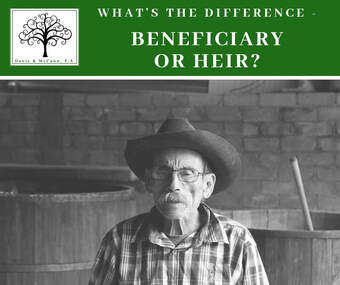 Q: My uncle recently died. I received a notice from his family attorney stating I am a beneficiary in my uncle’s estate. Am I also an heir? What exactly do these terms mean? A: Under Kansas law, a beneficiary is a person or organization that receives money or property because someone specifically named them in their Will or Trust. In your case, because you’ve been notified that you are a beneficiary, your uncle mentioned you in his Will by name to receive something from his estate. The item(s) being given could be things like money, property, or personal items like jewelry or a family heirloom. Beneficiaries can include a person, charity, or organization. An heir is a relative who would inherit under the laws after the death of someone. If the deceased person (also known as the decedent) did not have an estate plan in which he or she named beneficiaries then the heirs would inherit the property. What property an heir is entitled to after the death of a decedent is determined according to the laws of the State that the decedent was a resident of when he or she died. In Kansas, an heir could be a spouse, child, parent, sibling, niece or nephew. For instance, if an unmarried individual dies in Kansas and does not have children, Kansas law states that their property is to be distributed equally to their parents. One common misconception is that if a person in Kansas dies and they are married with minor children, all of their property will be distributed to their spouse. This is not true. Instead, half of the property will be distributed to their spouse and half to their minor children. Oftentimes, people want their property to go to individuals other than their heirs. This is one of the reasons why it is a good idea to have an estate plan in place and to know who your heirs are if you don’t. An important thing to note is that a person can be both a beneficiary and an heir. In fact, most Wills and Trusts are set up by individuals leaving property to their heirs who they are naming as beneficiaries in their estate planning documents. For example, a child named in a Will set up by their parent is a beneficiary of the Will and an heir of their parent. For more information on beneficiaries and heirs, contact Davis & McCann, P. A., Dodge City, KS. We are members of Wealth Counsel, a national consortium of Estate Planning Attorneys and the National Academy of Elder Law Attorneys (NAELA). We focus our practice on providing clients with the best legal advice on Estate Planning, Medicaid and Long-term Care Planning, Family Business/Small Business Succession Planning, Probate, Trust Administration, Real Estate Transactions, and related matters. Comments are closed.
|
NEWS YOU CAN USEDavis & McCann, P. A., Archives
April 2021
Categories
All
|

 RSS Feed
RSS Feed